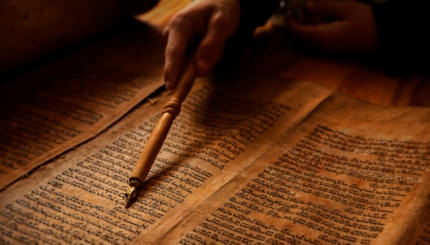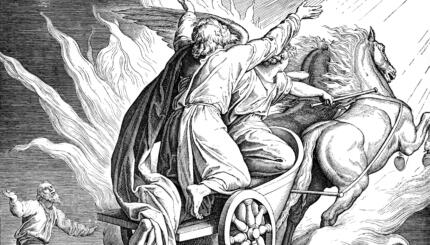Commentary on Parashat Vaera, Exodus 6:2-9:35
Divine chastisement, brought in the form of affliction and suffering, can be an effective, if undesirable, instrument for individual and social learning. The 10 plagues that God visits on the Egyptians and their Pharaoh in this week’s portion Vaera (as well as in next week’s portion Bo) publicly demonstrate God’s power to both Egypt and Israel.
In the warnings and reproofs accompanying the plagues, God and Moses use 10 variations of the phrase “to know the Lord.” After Pharaoh beseeches Moses to end the seventh plague of hail, Moses tells him it will stop once he (Moses) leaves the city and spreads out his hands to God.
Moses admonishes Pharaoh: “That you may know that the earth belongs to the Lord (Exodus 9:29).” This phrase, expressing the dominion of God and the limits to humans’ power and control over the earth, has relevance for and resonance with modern man’s place in the world and humanity’s role in the current environmental predicament.
The Plague of Hail
The plague of hail was qualitatively much harsher than the ones preceding it, and God’s forewarning was correspondingly the longest and most severe until then. In this warning, however, was a strong measure of Divine compassion for the Egyptians. God urges them to bring in their servants and animals from the field to spare them from destruction. The God-fearing among the Egyptians heeded and lived, while the heedless perished (Exodus 9:19-21).

Help us keep Jewish knowledge accessible to millions of people around the world.
Your donation to My Jewish Learning fuels endless journeys of Jewish discovery. With your help, My Jewish Learning can continue to provide nonstop opportunities for learning, connection and growth.
It was this Divine compassion that moved Pharaoh to repent, albeit temporarily, for the first time following a plague. Pharaoh summons Moses and declares: “This time I have sinned; The Lord is the Righteous One; and I and my people are the villains (Exodus 9:27).” Here Moses describes how he will leave the city and spread out his hands to heaven, upon which God will stop the hail “that you may know that the earth belongs to the Lord.”
The instant cessation of the unprecedented torrential hail and thunder displays the supernatural, miraculous quality of God’s control over meteorological phenomena. The Daat Mikra commentary (Israel, 20th century) explains “‘That you may know’: Your request will be granted, and the plague removed, not because you can be trusted to fulfill your promise to let the people go, but rather so that it will be proved to you and you will know that the earth is under God’s control, and He can do what He wants with it–at His word it hails, and at His word it ceases.”
Whose Earth?
Many additional commentators contrast our verse with the apparently contradictory verse from Psalms: “The heavens belong to the Lord, but the earth He has given to man (Psalms 115:16).” Is the earth the Lord’s or man’s? Under which conditions? Expounding this verse will help provide answers and lead to a concluding discussion on man and modern environmental problems.
Psikta Zutra reconciles the two verses by specifying that humans’ dominion over the earth is conditional on their following the will of God. If they do so, they are granted the earth for their use and enjoyment; if not, the land reverts to God.
Similarly, according to Mezudat David on this verse, “God gives the land (in this case, the land of Israel) to the ones who are righteous in His eyes and will be for a blessing in its midst.”
In Tractate Berakhot, R. Levi explains that “the earth is the Lord’s” applies before one has made a blessing on the enjoyment of the earth’s bounty and thereby acknowledged the ultimate source of material goods, while “the earth He has given to man” applies after one has made such a blessing.
Rabbi Jonathan Sacks, the former Chief Rabbi of the United Kingdom, elaborates: “A blessing is therefore an act of acknowledgement of God’s ownership. If we do not make one prior to enjoying the things of this world, it is as if we had made secular use of God’s property. Once we have made a blessing, we have, as it were, redeemed the source of pleasure (buying it back for private use by our offering of words). Once we symbolically give something back to God, He gives it back to us.”
Modern-Day Plagues
At all events, even when the earth is given over to human dominion, humankind does not have free reign to do whatever it wants with it. The need for careful, considerate, and compassionate stewardship of natural resources is emphasized time and again throughout the .
The plagues were expressions of God’s power over the earth. They were intended as a reproof to the arrogant Pharaoh and a demonstration to the Egyptians of the limits to his power and the fallacy of their trust in him.
Modern man has set himself as absolute master of the biophysical world. In pursuit of technological mastery and material prosperity, many in modern society have lost the sense of a greater transcendent power and of a meaning and purpose beyond the world they know. This has had drastic moral and environmental ramifications.
Now, modern-day “unnatural plagues” are occurring with greatly increasing frequency around the world: land degradation, including deforestation and soil erosion; water stress, leading to pollution and depletion of freshwater and decimation of ocean fish stocks; stress on biota, resulting in extinctions and the spread of invasive species; and atmospheric pollution, including local and regional air pollution, ozone layer depletion, and greenhouse gases.
The accumulated emissions of these greenhouse gases are accelerating climate change, which, besides greatly exacerbating many of the other environmental problems just mentioned, is evidently already starting to increase the frequency and intensity of extreme weather events such as hurricanes, flooding, and droughts. These problems are consequences or manifestations of humankind’s assault on the biosphere and the growing perturbation of planetary life-support systems.
This time, these “plagues” have not been wrought directly by God but are anthropogenic. And for the present and looming environmental catastrophes, we lack immediate Divine warnings, as they are the work of man. Scientists and others have warned of calamity from the continued degradation of the environment, and, until perhaps very recently, they have been largely unheeded.
Jewish Responsibility
But unlike the generation of the Exodus, the Jewish people today do not enjoy special protection from environmental harm, and the land of Israel will not be spared from environmental assault as was Goshen, the Egyptian territory where the Jews resided. In the Diaspora, and in the land of Israel particularly, Jews will suffer along with the rest of creation from the ravages of ecological degradation and climate change.
Deeply enmeshed in modern industrial society, we bear our share of moral responsibility for what is happening. As ancient champions of the helpless and victimized in society, Jews should be especially concerned that those least responsible for the majority of environmental insults since the industrial revolution not bear the brunt of the consequences.
But indications are that the poorer parts of the world will experience more extreme consequences of climate change while having less technological and financial wherewithal to cope with them.
Looking to mend one’s own environmental ways may be inadequate to address the scope and complexity of the problems. The modern political economy has a built-in tendency to export environmental threats over distance and time and to obscure responsibility for their creation. The consumer, businessman, or banker tends not to realize he is trampling the earth through his ordinary commercial activities, which he may pursue only as one small link in a destructive global system.
God’s display of power and mercy during the plague of hail was enough to bring about a temporary change of heart in Pharaoh, but by that time his sins and stubbornness had already set him and his nation on the road to ruin. Let us work for and pray that collectively we will heed the mounting environmental warning signs and change course in time to avoid consigning ourselves to the same fate.
Provided by Canfei Nesharim, providing Torah wisdom about the importance of protecting our environment.



